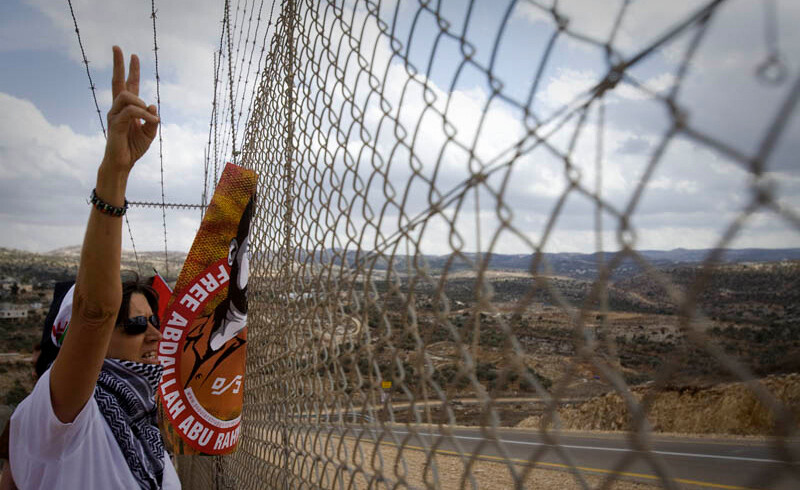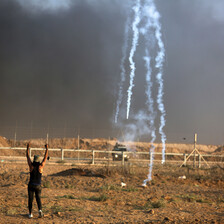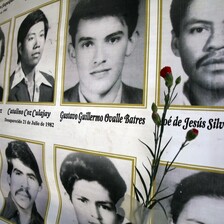The Electronic Intifada 11 June 2011

Connecting issues and joint struggle will build a better future.
ActiveStillsToday, in the Western world, as Arizona and the United States await the fateful decision by Arizona Schools Chief John Huppenthal on whether Tucson Unified School District (TUSD) is non-compliant with the Ethnic Studies ban, 10,000 miles away fellow youth leaders carry the Arab Spring into summer.
As youth activists organizing to defend and preserve Ethnic Studies in Arizona, we’d like to highlight some related, global issues in our struggle. Arizona residents alert to the history of these lands know very well the issues of human displacement, expulsion, transfer, ethnic cleansing and extermination. More importantly, they know of the historical consequences of equality denied and justice delayed.
Speaking as Arizona youth intermingled with indigenous, white, Arab, Jewish and Chicana/Mexicana roots, Arizona’s history relates to us as descendants of both settler and indigenous peoples. This history can provide insight into the Israel-Palestine conflict and prospects for peace in those torn borderlands of 1948, 1967, and today.
A review of the history of modern Palestine reflects a startling image of the conquest and colonization of traditional indigenous lands settled by the US.
In his essay “The Iron Wall,” one of the “founding fathers” of Israel, Ze’ev Jabotinsky, outlines a basic observation of human history that “there has never been an indigenous inhabitant anywhere or at any time who has ever accepted the settlement of others in his country.” An honest cynic, Jabotinsky recognized that the Palestinian indigenous population “look upon Palestine with the same instinctive love and true fervor that any Aztec looked upon his Mexico or any Sioux looked upon his prairie. To think that the Arabs will voluntarily consent to the realization of Zionism [a form of Jewish nationalism aiming to create a Jewish state] in return for the cultural and economic benefits we can bestow on them is infantile.”
Jabotinsky knew, as Israeli leaders know today, that the indigenous peoples must be driven out by force if policies of foreign settlement are to be maintained: “Zionist colonization must .. proceed regardless of the native population and it should continue “behind an iron wall, which the native population cannot breach,” he wrote.
After all, “there are circumstances in history that justify ethnic cleansing,” remarked leading Israeli historian, Benny Morris to the Israeli newspaper Haaretz in 2004. “Even the great American democracy,” Morris says, “could not have been created without the annihilation of the Indians.”
Indeed, settler movements act alike to justify the indefensible. But the dispossessed tell a different story of lost family and land connections, impaired way of life and damaged cultural ties from generation to generation.
Another crucial aspect of settler-colonialism is to deny native peoples access to their cultural institutions which preserve and enrich their heritage, memory and future generations.
This is where the struggles of Chicana/Mexican-American, Palestinian and Native indigenous peoples intertwine. In Ethnic Studies, we retain the power in our social-based education to keep our culture from being erased. Indeed, the retention of culture and educational integrity are the most threatening obstacles to dominant groups attempting to overpower minority ethnic groups as in Arizona and Palestine.
This is not only true in a state such as Arizona where HB2281, signed into law in May 2010, outlawed Ethnic Studies programs on false grounds of promoting racism and the “overthrow of the US government” — enabling economic sanctions on any school district rendered non-compliant with the ban (“Arizona bill targeting ethnic studies signed into law,” Los Angeles Times, 12 May 2010). One of Israel’s most prominent military and political leaders, former Prime Minister Ariel Sharon, was quoted by Haaretz in 2004 admonishing that “Palestinian education and propaganda are more dangerous to Israel than Palestinian weapons.”
Current Arizona Attorney General Tom Horne (previously AZ Schools Chief) and Gov. Jan Brewer couldn’t have been more eloquent in their own recognition that Ethnic Studies is “dangerous” because it enables our people to retain our education on our terms rather than simply accept imposed history.
Israel’s own Ethnic Studies ban might make them blush with pride. On 22 March, the Israeli Knesset (Parliament) passed the “Nakba Law,” which banned schools from teaching the Nakba — the ethnic cleansing of Palestine that coincided with the creation of Israel. Also like HB2281, the “Nakba Law” enables the state to withhold public funding to institutions which fail to comply with the law.
In a letter sent to Israeli legislators prior to the vote, Adalah, the Legal Center for Minority Rights in Israel, warned that “the law stood to cause major harm to the principle of equality and to the rights of Arab citizens to preserve their history and culture” and urged the bill to be rejected, according to the organization’s 27 March press release (“Adalah: Law violates rights of Arab minority to preserve its history and culture”).
A less discussed aspect of HB2281 bans Arizona Ethnic Studies programs from “advocating ethnic solidarity.” We proudly violate this aspect of the law in our solidarity with Palestinians and Native indigenous peoples.
When dominant powers realize that ethnic minority groups merely want equal rights within a society, we can all live among each other in respect and mutual dignity.
It is through seeing these connections, and joining in each other’s struggles, that we can come one step closer to building a better world for ourselves and future generations.
Yusi El Boujami is an Arab-Jewish American sophomore at City High School.
Gabriel Schivone is a Chicano-Jewish American and a student at the University of Arizona and a coordinator of AZ Jewish Voice for Peace, Students for Justice in Palestine and passenger on Gaza Freedom Flotilla 2 sailing in late June 2011.
Ryan Velasquez is a Chicano American and a City High School 2011 graduate who gained national attention in late April 2011 when he and eight other Tucson high school youth chained themselves to the Tucson Unified School District (TUSD) School Board’s chairs and dais in order to prevent a resolution vote that would comply with HB2281’s ban on Ethnic Studies.




Comments
Palestine/Israel
Permalink RockyMissouri replied on
I think it is the cruelty of Israel itself, that will be its' own undoing. From rhe smallest of cruelties, to the denial of learning how their own people were slaughtered by the very folks who have claimed moral superiority over others is heartbreaking.
I give the Palestinians hope... soon, that we are beginning a
new conversation, that will produce a good result, this time.
Native Australians
Permalink Tony Dean replied on
I would add to the sorry list of indigenous peoples overwhelmed by imperialism the Australian aborigines. Not only did the British destroy their culture, but they also disastrously damaged the land of the continent by the introduction of animals like the rabbit, the cat, the dog, the camel and the cat. But it is worth remembering that, throughout the centuries, ethnic cleansing been shown to be the normal practice of human beings, when they have tho power to carry it out. After all, the entry of the Israelites into Canaan was accompanied by ethnic cleansing. Their first action after crossing the Jordan was to destroy almost all the inhabitants of Jericho. Could it be that we human beings suffer from some fundamental moral defect, which is common to all nations in all ages of our history?
Palestine and US indigenous comparison
Permalink Ellen Cantarow replied on
I am so appreciative of the fact that this eloquent article was written by very young people. In the US there is little to give us hope, but the presence of such activists helps a great deal.
Fixed Frequencies
Permalink Adam G. replied on
Reminds me of the song "Fixed Frequencies" by Propaghandi:
Here in the land that Abraham was promised to receive
We listen to you catechize from your pulpit overseas
You mourn the proofs of our barbarity.
But dry your eyes, oh Pharisee: we both speak a settler's cant.
We both read from the same old played out scripts and hum familiar tunes,
Broadcast on fixed frequencies, stuck in locking grooves.
We both profess noble intent
As we civilize human impediments.
So if your hands are clean then noblesse oblige
Wipe those "who me?" looks off your faces and concede
Our designs separated by nothing more than place and time.
Different scenes, same crimes.
Pray, let him who's without sin cast the first statues of
The former rogues turned folk heroes that your forefathers hung.
Don't lecture me about plundered soil
While you loaf upon your father's spoils.
We want nothing more than what you already have:
A comforting set of exculpatory "facts"
Like the myth of an empty land and a conquest so complete
We can pull these tanks from our streets
And hand the loose ends over to
Bureaucrats and become just like you
Lounging carefree in your cafes,
Absolved from sin and human grenades.
Entre nous, how did your desert bloom?
http://www.youtube.com/watch?v...
adamgroff[at]hotmail.com
thank you
Permalink saffo replied on
thank you for this beautiful statement.